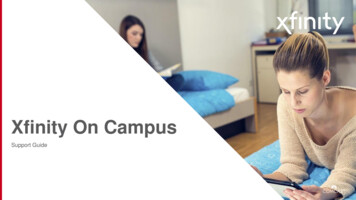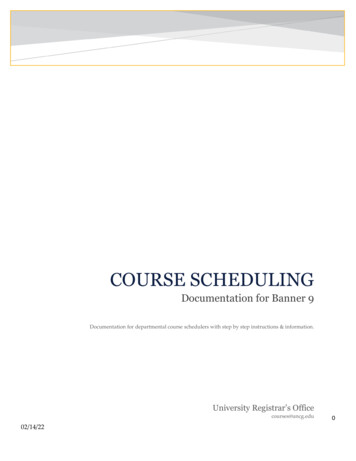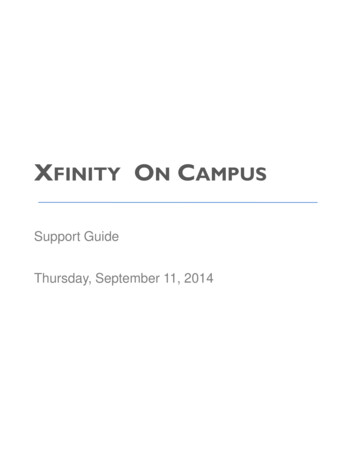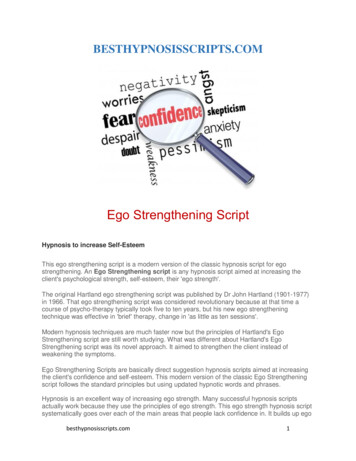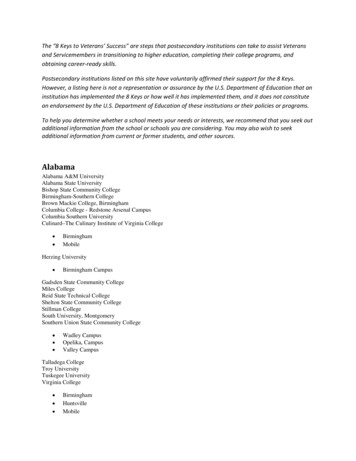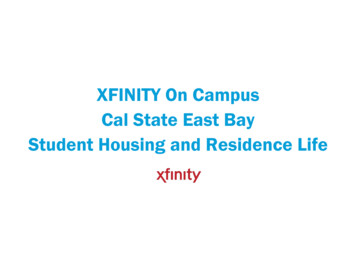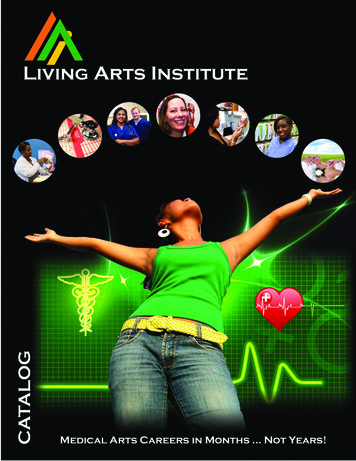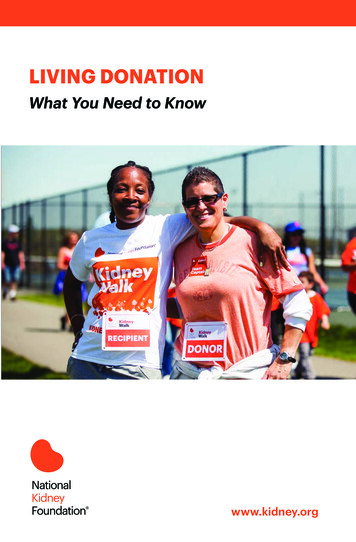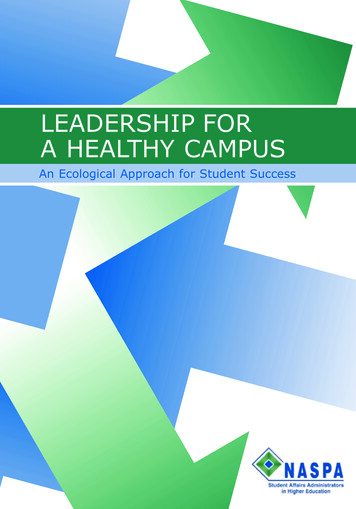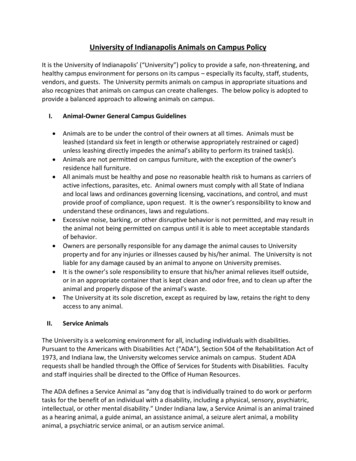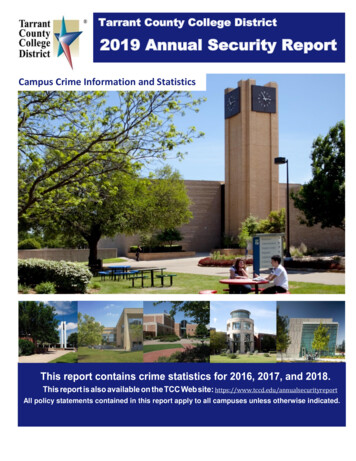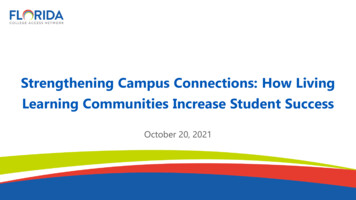
Transcription
Strengthening Campus Connections: How LivingLearning Communities Increase Student SuccessOctober 20, 2021
Welcome!Dr. Kristen HengtgenSenior ResearcherFlorida College Access Networkkhengtgen@FloridaCollegeAccess.org
Today’s Presenters Guest PresenterDr. Brenda SpencerNeudy NuñezDirector, Living-LearningCommunity Program,Florida A&M UniversityAssistant Dean ofStudents and Director forthe Office of MulticulturalAffairs, University of SouthFloridaJasmine WelchDelaenam AkahohoJunior (Biology/PreMedicine major),Florida A&M UniversityFirst-year master’s student(College of Public Health),University of South Florida
Questions & Conversation Submit your questions in the box Share on social his webinar is being recorded; all materialswill be available within a week of recording
Our mission:We lead the collaborativemovement to ensure everyFloridian achieves aneducation beyond highschool and a rewardingcareer.Our vision:A Florida working together,where education is thepathway to economicmobility for all.
FCAN’s WorkResearch and Data FCAN publishes research and data on evidence-basedpractices and policy opportunities to strengthen Florida's talent pool.Local college access networks (LCANs) LCANs support 82% of the state’spopulation. These organizations are made up of community leaders who come togetherto create solutions and partnerships to support local talent development.Statewide Initiatives FCAN coordinates 4 College Ready Florida initiativesthat provides schools and community organizations resources to helpstudents continue their education after high school.
Seven Conditions That Make Florida Talent StrongOpportunity forEveryoneMultiplePathwaysClear Informationand Decision-makingCommunityCollaboration
Introduction to Living Learning Communities (LLCs)
What are Living Learning Communities?At both two- and four-year colleges across the nation, LLCs are agroup of students who live on the same floor of a residential hall andshare an interest in a common theme or major. Often, LLCs offer studentsaccess to events and resources, connect students with faculty, and bringstudents together inside and outside of the classroom.
Research background LLCs were identified as one of ten “high impact best practices” by theNational Survey of Student Engagement, positively associated withlearning, retention, and degree completion. Only about 15% of first-year students participate LLCs have been shown to: increase student retention rates and academic performance increase overall satisfaction with college increase class attendance and participationUltimately, LLCs increase student engagement, which positively affectsstudent outcomesSources: Karen Kurotsuchi Inkelas, Jody E. Jessup-Anger, Mimi Benjamin and Matthew R. Wawrzynski. Living Learning Communities that Work. Stylus, 2018; Kevin Fosnacht,Polly Graham, Robert Gonyea, and Kyle Fassett, “Revisiting the Impact of LLCs on Student Engagement and Success.” ACUHO-I Academic Initiatives Conference, 2019.
Why does this matter? 1 in 3 students do not complete a bachelor’s degree in sixyears. Regardless of credential level, first-generation students aremore likely stop out after their first year than their continuinggeneration peers. They are also less likely to participate inextracurricular activities, conduct research with faculty, or hold aleadership role.Source: National Student Clearinghouse Research Center, 2018; RTI International, First-generation College Graduates’ Participation inExtracurricular and Co-curricular Activities as Undergraduate Students. Washington, DC: NASPA. 2021.
Guest PresenterDr. Brenda SpencerDirector, Living-Learning CommunityProgram, Florida A&M University
Florida A&M University (FAMU)Living-Learning Community (LLC) Program
FAMU Living-Learning Community Program Started in Fall 2015Part of FAMU’s student success initiativesPartnership between Academic Affairs and Student Affairs13 major-specific LLCs; over 300 students annuallyFirst-year students apply via the University’s Housing ApplicationPortal and are accepted based upon specific academic criteria per LLC Designated Faculty/Staff Liaison per LLC Designated Resident Assistant per LLC LLCs located in one residence hall
FAMU Living-Learning Community Program Accepted students live together on same floor of the residence hallaccording to major area LLC roommate Students must sign an LLC Student Agreement Form Students remain in the program for one academic year
Provost’s Leadership LLC
FAMU Engineering LLC
College of Agriculture and Food Sciences LLC
School of Allied Health Sciences LLC
School of Architecture and Engineering Technology LLC
School of Business and Industry LLC
College of Education LLC
School of the Environment LLC
School of Journalism and Graphic Communication LLC
School of Nursing LLC
College of Pharmacy and Pharmaceutical Sciences LLC
College of Science and Technology LLC
College of Social Sciences, Arts and Humanities LLC
FAMU Living-Learning Community Program Activities Faculty EngagementShared ClassesStudy GroupsGroup Activities/ProjectsService LearningCareer/Experiential LearningLeadership DevelopmentGlobal EducationField TripsCultural and Social Events
Benefits of LLCs Higher First-Year GPAsHigher Faculty and Student EngagementHigher Retention RatesHigher College Satisfaction RatesHigher Graduation Rates
Guest PresenterNeudy NuñezAssistant Dean of Students andDirector for the Office of MulticulturalAffairs, University of South Florida
FCAN Webinar:LLCs:A Bridge to Student SuccessNeudy Carolina Nuñez,Assistant Dean of Students10/20/21
LLC Best Practice ModelImplemented at USF“ICING”IntentionalintegrationStudy groupsK-12 outreachVisiting work settingsCareer esidence hallspace
Living Learning Communities at USF“Living Learning Communities at USF are residential communitiesdesigned to provide students a cohort experience with peers that sharesimilar academic, career, and co-curricular interests.”The best way to really learn something, is to live it!
LLC Program Data Highlights
Thank you!
Panel Discussion Guest PresenterDr. Brenda SpencerNeudy NuñezJasmine WelchDelaenam AkahohoDirector, Living-LearningCommunity Program,Florida A&M UniversityAssistant Dean ofStudents and Director forthe Office of MulticulturalAffairs, University of SouthFloridaSophomore(Biology/Pre-Medicinemajor), Florida A&MUniversityFirst-year master’s student(College of Public Health),University of South Florida
Q&A
Learn More:Consider registering to participate in the College Ready tives/For upcoming webinars, policy briefs, and promising practices,subscribe at:FloridaCollegeAccess.org/subscribe
FAMU Living-Learning Community Program Started in Fall 2015 Part of FAMU's student success initiatives Partnership between Academic Affairs and Student Affairs 13 major-specific LLCs; over 300 students annually First-year students apply via the University's Housing Application
